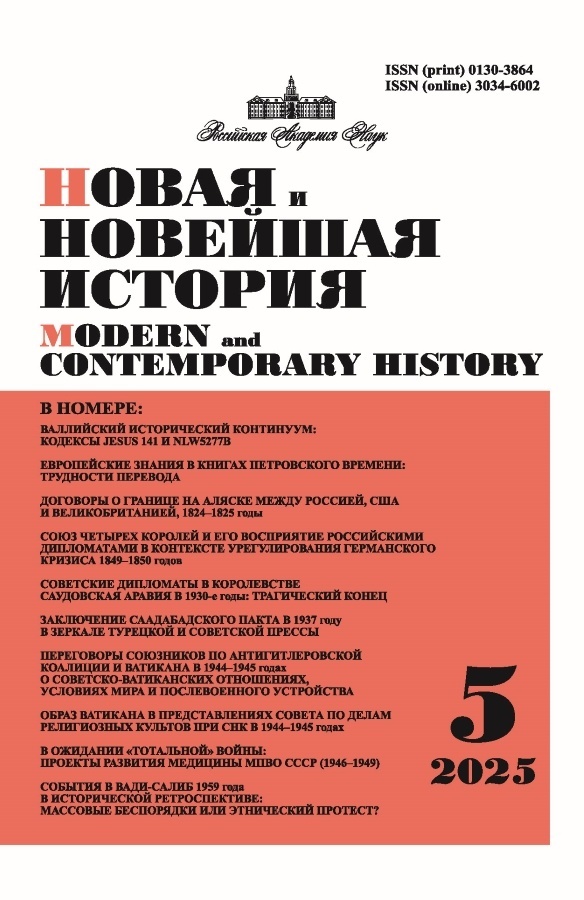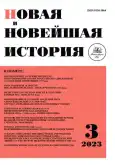“It Is Favorable To the Forces of Socialism to Keep the Americans in Southeast Asia Longer”: The Presidium of the CPSU Central Committee in the Determination of the Strategic Line of the USSR in the Second Indochina War of 1965
- Authors: Naumkin V.V.1,2, Skorospelov P.P.3
-
Affiliations:
- Institute of Oriental Studies of the Russian Academy of Sciences
- Academic University for the Humanities
- Russian State Archive of Socio-Political History (RGASPI)
- Issue: No 3 (2023)
- Pages: 131-153
- Section: 20th century
- URL: https://rjsvd.com/0130-3864/article/view/671018
- DOI: https://doi.org/10.31857/S013038640025913-2
- ID: 671018
Cite item
Abstract
Based on a scrupulous review of a large body of documents from Russian and a number of foreign archives, and for the first time introduced into scholarly discourse, this article contemplates a period in the Soviet Union’s history when the influence of the USSR in world affairs reached its zenith. It was a short by historical standards span, when the so-called “collective leadership” headed by Leonid Brezhnev, Alexey Kosygin, and Nikolay Podgorny was at the helm of the Soviet state. The authors of the article show that it is unlikely that the USSR’s transformation into one of the world’s superpowers would have been possible were it not for the US’s defeat in Indochina. With the aim of proving this premise, the authors have focused on developments related to one of the turning points of the Cold War – the first half of 1965. In this context, the article closely analyzes the course and results of the negotiations between Kosygin and the leaders of the DRV, PRC, and DPRK. In fact, it was then, as evidenced by researched documents, that the Soviet Union turned de facto from an observer into an actual participant in the Vietnam War (and, more broadly, in the confrontation with the United States in the Far East) as part of the anti-American coalition of the USSR–PRC–DRV–DPRK. And although the authors in this case are talking about a strategic idea – as it happens in real politics – its birth was almost accidental, while the genuine masterminds of this geopolitical combination under consideration have remained in the shadow of history for many years.
About the authors
Vitaliy Vyacheslavovich Naumkin
Institute of Oriental Studies of the Russian Academy of Sciences; Academic University for the HumanitiesRussian Federation, Moscow
Petr P. Skorospelov
Russian State Archive of Socio-Political History (RGASPI)Russian Federation, Moscow
References
- Александров-Агентов А.М. От Коллонтай до Горбачева. М., 1994.
- Аносова Л.А., Благов С.А., Локшин Г.М. и др. Полная академическая история Вьетнама. Т. IV. Ч. I. Новейшее время (1897–1975 гг.) / ред. О.В. Новакова. М., 2014.
- Артизов А.Н., Сигачев Ю.В. В октябре шестьдесят четвертого: смещение Хрущева. М., 2020.
- Бовин А.Е. XX век как жизнь. Воспоминания. М., 2017.
- Богатуров А.Д. Великие державы на Тихом океане. М., 1997.
- Брежнев Л.И. Рабочие и дневниковые записи. Т. 1. М., 2016.
- Война в Корее, 1950–1953 / ред. С.С. Потоцкий. СПб., 2003.
- Зусманович Д. Советско-американские отношения и война во Вьетнаме. 1964–1968 гг. М., 2016.
- Капица М.С. На разных параллелях. Записки дипломата. М., 1996.
- Ковалев И.В. Диалог Сталина с Мао Цзэдуном (интервью с личным представителем И.В. Сталина в Китае И.В. Ковалевым) // Проблемы Дальнего Востока. 1991. № 6. С. 83–93.
- Колотов В.Н. Стратегические приоритеты ДРВ и США во Второй Индокитайской войне // Восток (Oriens). 2022. № 5. С. 55–67.
- Ле Зуан. Письма на Юг. Cб. писем и телеграмм / пер. с вьет. М., 1987.
- Огнетов И.А. На вьетнамском направлении. М., 2007.
- Пихоя Р.Г. Москва. Кремль. Власть. Т. II. 1964–1985. М., 2009.
- Попов И.М., Лавренев С.Я., Богданов В.Н. Корея в огне войны. М., 2007.
- Президиум ЦК КПСС. Стенограммы. 1954–1964. Т. 1. М., 2004.
- Прозуменщиков М.Ю. Спор идет о слишком больших вещах. Неудавшаяся попытка советско-китайского примирения. 1964–1965 гг. // Исторический архив. 2007. № 1. С. 3–25.
- Россия (СССР) в локальных войнах и военных конфликтах второй половины XX века. М., 2002.
- Свечин А.А. Стратегия. М.; СПб., 2003.
- Симонов Н.С. ВПК СССР. М., 2015.
- Скороспелов П.П. «Особый способ осуществления внешней политики путем угрозы войны империалистам». Военно-политическая деятельность Президиума ЦК при Н.С. Хрущеве (1953–1964 гг.) // Восток (Oriens). 2022. № 2. С. 9–28; № 3. С. 6–30.
- Советская военная мощь от Сталина до Горбачева / отв. ред. А.В. Минаев. М., 1999.
- Хрущёв Н. 1964. Стенограммы пленума ЦК КПСС и другие документы. М., 2007.
- Easter D. Britain and the Confrontation with Indonesia, 1960–66. London, 2012.
- Gaddis J. Strategies of Containment. Oxford, 2005.
- Gaiduk I.V. Confronting Vietnam. Soviet Policy toward the Indochina Conflict. 1954–1963. Stanford, 2003.
- Gaiduk I.V. The Soviet Union and the Vietnam War. Chicago, 1996.
- Getlig E. Trouble Ahead in Afro-Asia: The United States, the Second Bandung Conference. The Struggle for the Third World, 1964–65 // Diplomatic History. 2015. Vol. 39. № 1. P. 126–156.
- Hershberg J., Jian C. Reading and Warning the Likely Enemy: China’s Signals to the United States about Vietnam in 1965 // International History Review. 2005. № XXVII. P. 47–84.
- Li Xiaobing. The Dragon in the Jungle. The Chinese Army in the Vietnam War. Oxford, 2020.
- Lüthi L.M. Reading and Warning the Likely Enemy – a Commentary: Signalling Across Four Continents // The International History Review. 2013. Vol. 35. Iss. 4. P. 807–816.
- MсMaster H.R. Dereliction of Duty: Johnson, McNamara, the Joint Chiefs of Staff, and the Lies That Led to Vietnam. New York, 1998.
- Olsen M. Soviet-Vietnam Relations and the Role of China, 1949–64. Oxford, 2005.
- Traсhtenberg M. Assessing Soviet Economic Performance during the Cold War // Texas National Security Review. 2018. Vol. 1. № 2. P. 76–101.
- United States – Vietnam Relations. 1945–1967. (The Pentagon Papers). Vol. IV. C. 6 (a). P. 4 // URL: https://archive.org/details/UnitedStatesVietnamRelations1945to1967VolI/mode/2up (access date: 09.03.2023).
- Victory in Vietnam. The Official History of the People’s Army of Vietnam, 1954–1975 / transl. by M.L. Pribbenow. Kansas, 2002.
- Wang D. Grand Strategy, Power Politics, and China Policy toward the United States in the 1960s // Diplomatic History. 2017. Vol. 41. Iss. 2. P. 265–287.
Supplementary files











